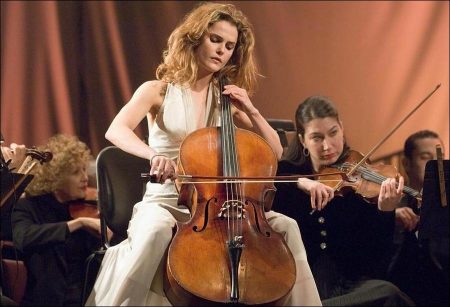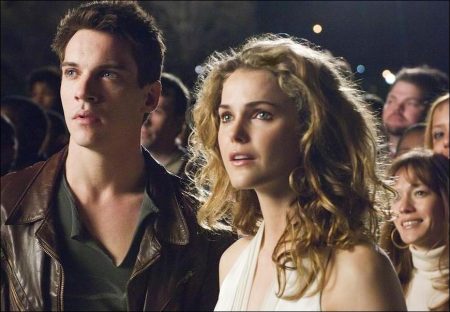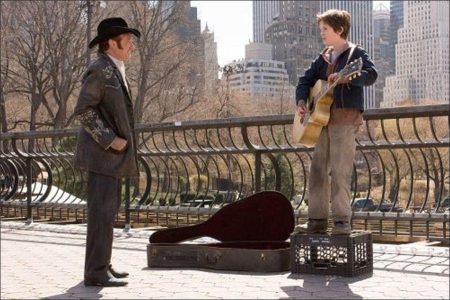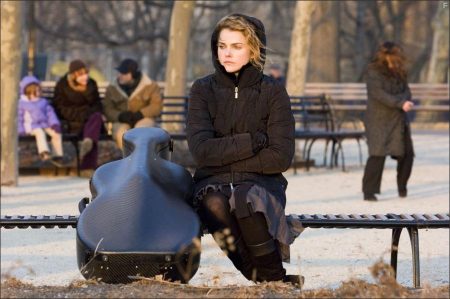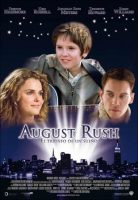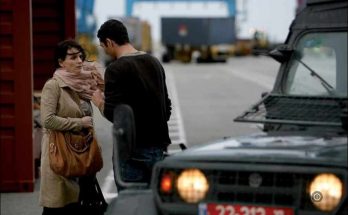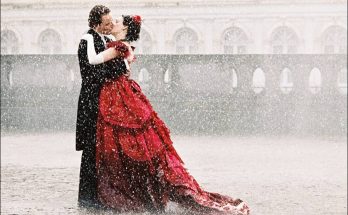Taglines: An incredible journey moving at the speed of sound.
August Rush tells the story of a charismatic young Irish guitarist (Jonathan Rhys Meyers) and a sheltered young cellist (Keri Russell) who have a chance encounter one magical night above New York’s Washington Square, but are soon torn apart, leaving in their wake an infant, August Rush, orphaned by circumstance. Now performing on the streets of New York and cared for by a mysterious stranger (Robin Williams), August (Freddie Highmore) uses his remarkable musical talent to seek the parents from whom he was separated at birth.
Twelve years ago, on a moonlit rooftop above Washington Square, Lyla Novacek (Keri Russell), a sheltered young cellist, and Louis Connelly (Jonathan Rhys Meyers), a charismatic Irish singer-songwriter, were drawn together by a street musician’s rendition of “Moondance” and fell instantly in love. Sharing the language of music, their connection was real and undeniable…but short-lived.
After the most romantic night of her life, Lyla promised to meet Louis again but, despite her protests, her father (William Sadler) rushed her to her next concert—leaving Louis to believe that she didn’t care. Disheartened, he found it impossible to continue playing and eventually abandoned his music while Lyla, her own hopes for love lost, was led to believe months later that she had also lost their unborn child in a car accident. Years passed with neither of them knowing the truth.
Now, the infant secretly given away by Lyla’s father has grown into a spirited and unusually gifted child (Freddie Highmore) who hears music all around him in the rhythms of life and can turn the rustling of wind through a wheat field into a beautiful symphony with himself at its center, the composer and conductor. Orphaned by circumstance, he holds a profound and unwavering belief that his parents are alive and want him as much as he wants them—if only they could find each other.
Determined to search for them, he makes his way to New York City. There, lost and alone, he is beckoned by the guitar music of a street kid playing for change and follows him back to a makeshift shelter in the abandoned Fillmore East Theater, where dozens of children like him live under the protection of the enigmatic Wizard (Robin Williams). That night, he picks up a guitar for the first time and unleashes an impromptu performance in his own unique style.
Astonished that this untrained boy can play so passionately, Wizard names him August Rush, introduces him to the soul-stirring power of music and begins to draw out his extraordinary talent. Wizard has big plans for the young prodigy but, for August, his music has a more important purpose. Never giving up hope of finding the parents he knows are out there somewhere, he calls out to them through every note. He believes that if they can hear his music, they will find him.
Unbeknownst to August, they have already begun that journey. Having just learned her son is alive, Lyla is already working desperately to locate him with the help of dedicated social worker Richard Jeffries (Terrence Howard) while Louis, still haunted by memories of his one true love, finds himself returning to his musical roots and retracing his steps to the place where they met. Separated by the events of life but bonded by love and music, Lyla, Louis and August search for what they lost and what will make their lives complete again…each other.
The Music Factor
“The music is all around us. All you have to do is listen.” – August Rush
Music plays a fundamental role in “August Rush.” Two years before production, the filmmakers began reaching out to numerous artists and music industry professionals for original material that would help tell their story. The result is an eclectic, dynamic soundtrack featuring more than 40 pieces of music that run the gamut from a lone harmonica solo to a full symphony orchestra. It incorporates classical, rock and gospel performances, in harmony with a comprehensive score by Grammy Award winner Mark Mancina that charts the turning points in the lives of August, Louis and Lyla, and culminates in a stirring orchestral piece called “August’s Rhapsody” which weaves all of it together.
Toward that end, they hired not one but three music supervisors—Jeff Pollack, Julia Michels and Nashville’s only female music supervisor, Anastasia Brown—to pool their talents, contacts and expertise.
Says Pollack, “The music in ‘August Rush’ is a significant part of the continuity and flow of the story, which is why Richard got so many people involved. We had to be sure all the elements were connected in a way that worked.” Throughout the process, the music supervisors collaborated closely with each other and with Kirsten Sheridan and Richard Lewis in suggesting songs and artists, auditioning, playing pieces for one another and voting on selections. “It was an ongoing, coast to coast, collaborative process.”
Their challenge was not in gathering existing material that might be fit into sequences, but in finding artists who might compose and/or perform songs for specific scenes or characters. “Not just a collection of songs, but each one with meaning and relevance,” notes Michels. Without a movie to show at the time, this involved circulating the script and describing the story to prospective musicians.
One of the many who were touched by the story and offered an original composition was multiple Grammy Award winner John Legend, a child prodigy himself, who wrote and performed the evocative “Someday” that plays over the end credits. It is the first time the platinum-selling artist has ever written for a film.
Jonathan Rhys Meyers performs three songs that are meant to be the work of his character, Louis, and therefore had to be original. Reflecting his state of mind at three different points in his life, each was commissioned from a separate source to best capture that progression. Meyers explains, “The song ‘Break’ was from the period before Louis met Lyla. It’s confident and impetuous, the energy of a 19 year old in a band who has come over from Ireland to make it in the American music industry. ‘This Time’ has a haunting, more subdued quality, timed to the period after they are separated. The last one, ‘Something Inside,’ reveals a more mature Louis coming to terms with himself as an adult, as someone who realizes he’s been denying his destiny for a long time and finally has the courage to move forward again.”
“Break” was written by alternative rock singer-songwriter John Ondrasik (Five for Fighting), who also provided an existing piece, “King of the Earth.” “This Time” was contributed by Chris Trapper, formerly of the alternative rock band The Push Stars, and the poignant “Something Inside” came from Lucas Reynolds of Nashville’s pop/rock group Blue Merle. “In each case,” notes Anastasia Brown, “the musicians worked from their impressions of the script and were absolutely open-minded and collaborative. They wanted what was best for the film.”
Meyers did his own singing, but studio musicians provided the sound of the band backing his vocals, while actors and additional musicians were hired to play those parts onscreen. Similarly, professional musicians provided the music for the scene in which Louis and August, unaware of each others’ identity, share a spontaneous guitar duet in the park. Because August is a raw talent whose playing is instinctive, it was determined that his fret work would have to be out of the ordinary. Rock and Roll Hall-of-Famer David Crosby, who lends vocals to the soundtrack and whose “incomparable perspective,” says Lewis, “contributed greatly to the credibility of the music from beginning to end,” suggested that he approach the instrument in the style of acclaimed guitarist Michael Hedges.
“It’s more rhythmic and percussive than traditional strumming, and likely what someone like August might do when he picks up a guitar for the first time,” Sheridan describes Hedges’ innovative style. Part of Freddie Highmore’s guitar training included studying tapes of the late Hedges’ performances.
Brazilian guitarist Heitor Pereira composed the piece Highmore and Meyers are seen playing in the park, entitled “Dueling Guitars,” performed by Pereira and Doug Smith and produced by Mark Mancina.
Declares Lewis, “It’s essentially a father talking to his son without words. It’s almost like a parent bird feeding a newborn chick in the nest; it’s squawking and the chick chirps back, and they learn to communicate.”
In another scene, August wanders into Harlem and is viscerally drawn to a church by the soulful sounds of a choir—and in particular the powerful voice of a young soloist. It’s not only the music that touches him but the words she sings, which are about rising above loneliness by turning your loss into beauty and song.
The song, “Raise It Up,” is one of several written and performed for “August Rush” by Harlem’s Impact Repertory Theatre, with the addition of actress/singer Jamia Simone Nash, who performs the solo. It was produced by Columbia University film school professor and Impact founder Jamal Joseph and jazz/R&B musician Charles Mack, who also sings with the choir. Among those who participated in bringing these diverse sounds together was legendary record producer Phil Ramone, an eight-time Grammy Award winner whose 50-year career includes collaborations with some of the biggest stars in the industry. Ramone, who played violin and piano before kindergarten and studied at Juilliard while still in high school, identified with August’s ability to hear music in nature and ambient noise because he experienced sound in much the same way.
“Phil is so attuned that he can feel it in his body if something sounds right or wrong,” marvels Sheridan. “For him, it wasn’t about the album or the songs themselves, it was about how they melded into each scene. We had to be constantly aware of the visuals and the emotional content we were matching.”
The same was true for Mark Mancina’s score, with one significant distinction: in this case, it was Sheridan who was often trying to guide the action to match the musical timing, which was created first. Traditionally, composers begin scoring a film when it is nearly complete, taking some of their cues from the temp music and determining what the filmmakers are trying to convey. Because of the nature of this story and the vital, cumulative role the music plays, it had to be approached differently.
“It was a different way of looking at a film and a score, and quite intimidating,” says Mancina. “Because all the early themes had to interweave and make sense pulled together at the end, I had to write the end first and move backwards. I must have worked out 70 versions of the structure, it was that complicated. Ultimately, I put the script up on the computer screen and moved the corresponding music up and down alongside it so you could tell what would be happening with each piece.
“To establish a connection among the three central characters, I used a three-note theme that plays for August, for Lyla and for Louis at different times throughout the story,” the composer continues. “That theme was part of a larger recurring theme representing the music that comes to August in overtones, which are those notes that most closely approximate the vibrations of nature. The movie begins with an overtone and ends with one.”
Another recurring melody is Van Morrison’s haunting “Moondance,” first heard when Louis and Lyla meet, then again when Wizard plays for August. The third time it is magically and surprisingly transformed into a classical waltz, echoing through the grand musical finale in New York’s Central Park.
Continue Reading and View the Theatrical Trailer
August Rush (2007)
Directed by: Kirsten Sheridan
Starring: Freddie Highmore, Keri Russell, Jonathan Rhys-Meyers, Terrence Howard, Robin Williams, Marian Seldes, William Sadler, Mykelti Williamson, Aaron Staton, Jamia Simone Nash
Screenplay by: Kirsten Sheridan, Richard Barton Lewis, Nick Castle, Jim Hart
Production Design by: Michael Shaw
Cinematography by: John Mathieson
Film Editing by: William Steinkamp
Costume Design by: Frank L. Fleming
Set Decoration by: Carol Silverman
Art Direction by: Mario Ventenilla
Music by: Mark Mancina
MPAA Rating: PG for some thematic elements, mild violence and language.
Distributed by: Warner Bros. Pictures
Release Date: November 21, 2007
Views: 116
